北师大高二英语选修六 Unit16 Lesson 3 (经典终极版本)(1)
北师大版高中英语选修6 Unit16_Lesson3_名师教学设计
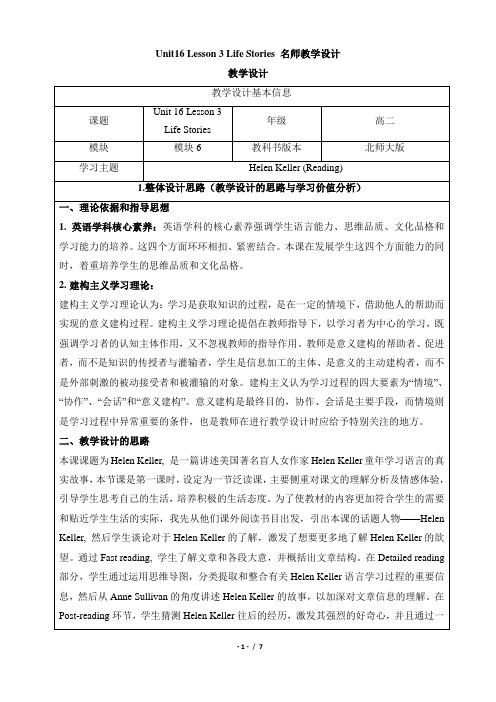
5.教与学的过程设计(课堂教与学的每个步骤的情境任务及其意图分析)
教学环节
教师活动
学生活动
设计意图
Lead-in
1.Ask Ss whether they like reading and what kind of books they often read.
To let Ss figure out the main ideas of the paragraphs and analyze the structure of the passage.
Detailed reading
1.Ask Ss to read part 1(para1-2) and answer the questions:
2. Watch the video to find out what happened to Helen later. They will be shocked and touched to find out that Helen even learned how to speak.
To let Ss know about Helen Keller’s later life experiences and success.
(Objective 1)
3. Ask Ss to retell Helen’s story from Anne Sullivan’s perspective.
3. Retell Helen’s story from the perspective of Anne Sullivan.
To let Ss practice expressing the sorted up information orally and get familiar with the content of the text.
北师大版高中英语选修6 Unit16_Lesson3_公开课教学设计(二)
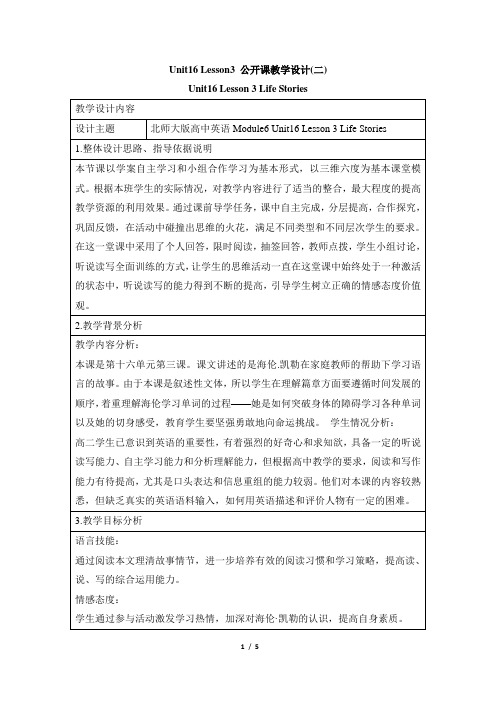
4.了解或模仿HelenKeller的习字过程。(小组自主选择任务项。)
通过主动获取信息、建构关于课文的相应图式知识,熟悉话题
课中
导入
Step1
TaskstheSstosharewhattheyknowaboutHelenKeller.
通过小组导学任务展示自然进入话题,激活背景知识,同时培养学生的实践性能力。
课文前两段背景文字生词密集,先让学生阅读,可为后面的情节做铺垫,同时复现生词。建立词汇库帮助学生更好地理解文中人物。
Step5
SsscantherestofthetexttofindoutthewordsHelenlearned.
TasksSstotellthedifferencesbetweendoll&waterandlove&think.
Unit16 Lesson3公开课教学设计(二)
Unit16Lesson3LifeStories
教学设计内容
设计主题
北师大版高中英语Module6Unit16Lesson3LifeStories
1.整体设计思路、指导依据说明
本节课以学案自主学习和小组合作学习为基本形式,以三维六度为基本课堂模式。根据本班学生的实际情况,对教学内容进行了适当的整合,最大程度的提高教学资源的利用效果。通过课前导学任务,课中自主完成,分层提高,合作探究,巩固反馈,在活动中碰撞出思维的火花,满足不同类型和不同层次学生的要求。在这一堂课中采用了个人回答,限时阅读,抽签回答,教师点拨,学生小组讨论,听说读写全面训练的方式,让学生的思维活动一直在这堂课中始终处于一种激活的状态中,听说读写的能力得到不断的提高,引导学生树立正确的情感态度价值观。
高二英语 模块6 Unit 16 Lesson 3 Life Stories-reading课件1 北师大版选修6

Read and find out the examples of words Helen learned.
water; doll; think; love
• What’s the difference among the four words “water; doll; think; love”
Pre-reading
What were her problems?
couldn’t see couldn’t hear
• blind = (severe ) restrictions • deaf couldn’t speak; read
couldn’t communicate
Reading strategy: prediction
What success did she achieve in her life?
Learning Objectives
• In this period, you will be able to 1. Learn to use some useful reading strategies: • to predict the general idea • to guess unknown words from the context. 2. Find out detailed information in the text.
a. Look at the title----
Helen Keller
b. look at the pictures c. Read the first couple of lines:
Helen Keller was a very special girl who needed a superb teacher. By the time she was seven years old, she still couldn’t speak, read or write.
北师大版高中英语选修6Unit16教案Lesson 3
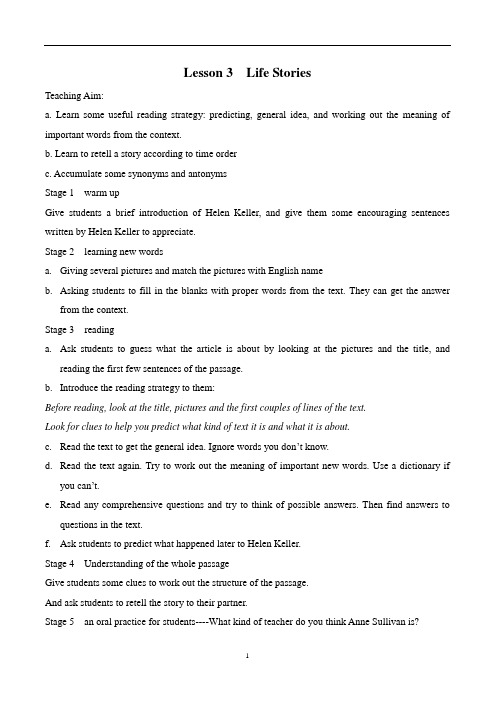
Lesson 3 Life StoriesTeaching Aim:a. Learn some useful reading strategy: predicting, general idea, and working out the meaning of important words from the context.b. Learn to retell a story according to time orderc. Accumulate some synonyms and antonymsStage 1 warm upGive students a brief introduction of Helen Keller, and give them some encouraging sentences written by Helen Keller to appreciate.Stage 2 learning new wordsa.Giving several pictures and match the pictures with English nameb.Asking students to fill in the blanks with proper words from the text. They can get the answerfrom the context.Stage 3 readinga.Ask students to guess what the article is about by looking at the pictures and the title, andreading the first few sentences of the passage.b.Introduce the reading strategy to them:Before reading, look at the title, pictures and the first couples of lines of the text.Look for clues to help you predict what kind of text it is and what it is about.c.Read the text to get the general idea. Ignore words you don’t know.d.Read the text again. Try to work out the meaning of important new words. Use a dictionary ifyou can’t.e.Read any comprehensive questions and try to think of possible answers. Then find answers toquestions in the text.f.Ask students to predict what happened later to Helen Keller.Stage 4 Understanding of the whole passageGive students some clues to work out the structure of the passage.And ask students to retell the story to their partner.Stage 5 an oral practice for students----What kind of teacher do you think Anne Sullivan is?Stage 6 ask students to finish exercise 3 and 4 by themselves.。
高中英语 Unit 16 Lesson 3 Life Stories教案 北师大版选修6
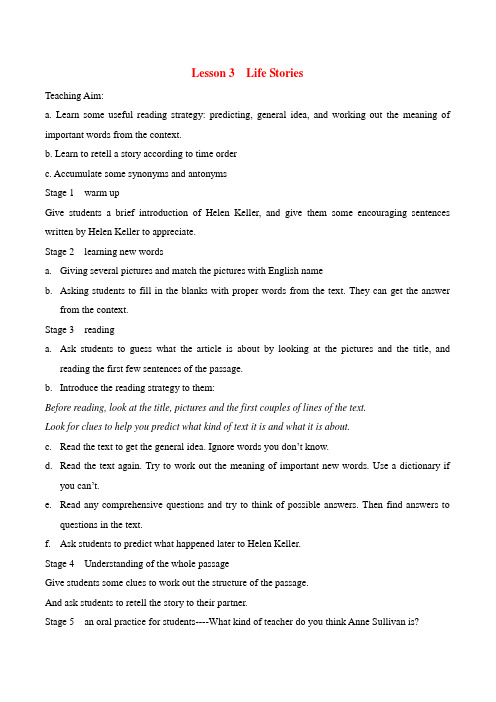
Lesson 3 Life StoriesTeaching Aim:a. Learn some useful reading strategy: predicting, general idea, and working out the meaning of important words from the context.b. Learn to retell a story according to time orderc. Accumulate some synonyms and antonymsStage 1 warm upGive students a brief introduction of Helen Keller, and give them some encouraging sentences written by Helen Keller to appreciate.Stage 2 learning new wordsa.Giving several pictures and match the pictures with English nameb.Asking students to fill in the blanks with proper words from the text. They can get the answerfrom the context.Stage 3 readinga.Ask students to guess what the article is about by looking at the pictures and the title, andreading the first few sentences of the passage.b.Introduce the reading strategy to them:Before reading, look at the title, pictures and the first couples of lines of the text.Look for clues to help you predict what kind of text it is and what it is about.c.Read the text to get the general idea. Ignore words you don’t know.d.Read the text again. Try to work out the meaning of important new words. Use a dictionary ifyou can’t.e.Read any comprehensive questions and try to think of possible answers. Then find answers toquestions in the text.f.Ask students to predict what happened later to Helen Keller.Stage 4 Understanding of the whole passageGive students some clues to work out the structure of the passage.And ask students to retell the story to their partner.Stage 5 an oral practice for students----What kind of teacher do you think Anne Sullivan is?Stage 6 ask students to finish exercise 3 and 4 by themselves.。
北师大版高中英语选修6-Unit16课件U16-L3-3
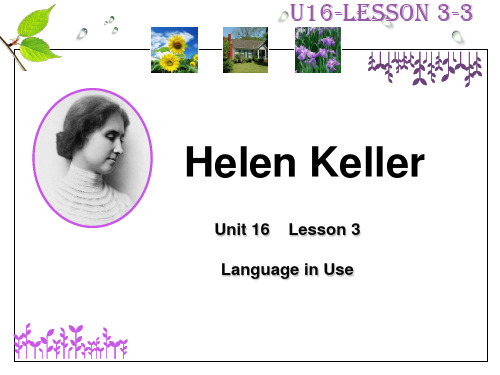
First-person Quotation
monkey-like imitation (line 26-27) a few early violets (line 50) put her arm gently round me (line 52) half in words, half in signs (line 59-60) in a flash (line 76) you feel the sweetness that it pours into
4 I like to be very _s_t_ra_i_g_h_tf_o_r_w_a_r_d___ (direct) when I talk about problems but my mother doesn’t like that. (para.3)
Ex. 3: Synonyms
5 We wanted to enter the contest but we couldn’t because there were lots of _r_es_t_ri_c_ti_o_n_s_ (limits). (para.1)
4 He was _u_n_ce_r_t_a_in__ (certain) of the correct date so he said he’d find out. (para.10)
Ex. 4: Opposites
5 Some people think small children are _t_ro_u_b_l_es_o_m_e__ (enjoyable) but I just love them! (para.2)
U16-Lesson 3-3
Helen Keller
Unit 16 Lesson 3 Language in Use
北师大高中英语选修六高二英语模块6Unit16Lesson3LifeStories-reading课件

became a teacheWr?hat does “former” mean?
She needed to stop Helen’s troublesome behaviour first.
• What did Anne Sullivan need to do first to prepare Helen to learn language?
love
Mistakes … head … spell …
first time … abstract
• What do you think happened later to Helen Keller?
• Find it out on page 100.
Homework
Write a summary of the story in about 100 words based on
think
—————————— It was the first time she
—
had understood an
love
(the 2nd She felt the meaning of
time)
“love” was
beautiful.
Sheakbnsetwrachterwtoeardch. er loved her and how to express her own feelings.
Brainstorming
• Imagine you are Miss Sullivan, and discuss in groups how you can teach the following words to Helen:
love water think
Unit 16 Stories—Lesson 3《Life Stories》教案(北师大选修6)
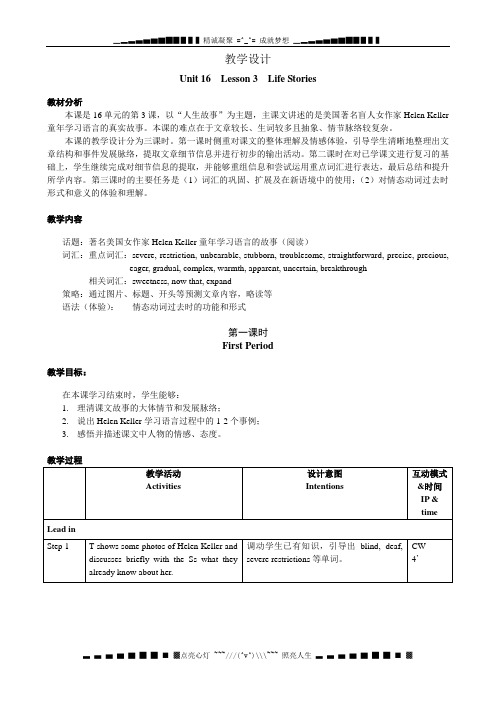
教学设计Unit 16 Lesson 3 Life Stories教材分析本课是16单元的第3课,以“人生故事”为主题,主课文讲述的是美国著名盲人女作家Helen Keller 童年学习语言的真实故事。
本课的难点在于文章较长、生词较多且抽象、情节脉络较复杂。
本课的教学设计分为三课时。
第一课时侧重对课文的整体理解及情感体验,引导学生清晰地整理出文章结构和事件发展脉络,提取文章细节信息并进行初步的输出活动。
第二课时在对已学课文进行复习的基础上,学生继续完成对细节信息的提取,并能够重组信息和尝试运用重点词汇进行表达,最后总结和提升所学内容。
第三课时的主要任务是(1)词汇的巩固、扩展及在新语境中的使用;(2)对情态动词过去时形式和意义的体验和理解。
教学内容话题:著名美国女作家Helen Keller童年学习语言的故事(阅读)词汇:重点词汇:severe, restriction, unbearable, stubborn, troublesome, straightforward, precise, precious, eager, gradual, complex, warmth, apparent, uncertain, breakthrough相关词汇:sweetness, now that, expand策略:通过图片、标题、开头等预测文章内容,略读等语法(体验):情态动词过去时的功能和形式第一课时First Period教学目标:在本课学习结束时,学生能够:1.理清课文故事的大体情节和发展脉络;2.说出Helen Keller学习语言过程中的1-2个事例;3.感悟并描述课文中人物的情感、态度。
*表示可灵活处理的活动。
第二课时Second Period 教学目标在本课学习结束时,学生能够:1.运用所学单词和短语描述Helen的学习语言的过程;2.讨论Helen和/或Anne成功的原因;*表示可灵活处理的活动。
北师大版高中英语选修6-Unit16课件U16-L3-1
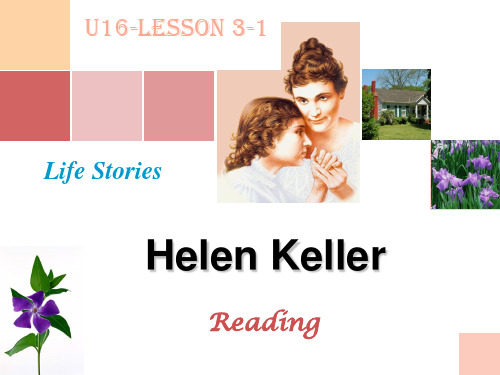
do
you
know
about
Anne
Sullivan?
Ex. II
Think !
Why do you think Helen behaved like this?
The desire to express myself grew. The few signs I used were not enough to make myself understood and this made me feel angry. I felt as if something was holding me, and I tried very hard to free myself. I often felt very tired and broke down in tears. I wanted to communicate with others so much that I found it unbearable. My troublesome behaviour occurred daily, sometimes hourly.
It was __m_o__n_k_e_y_-l_ik_e__ imitation.
water The world of words was _o_p_e_n__in_g__u_p__ to her.
Ex. VI
play with spell her hand a game monkey-like imitation
Ex. III
Read to learn
Scanning: Which paragraphs are the words in?
doll water love think love
高中英语 Unit 16 Lesson 3 Life Stories教案 北师大版选修6
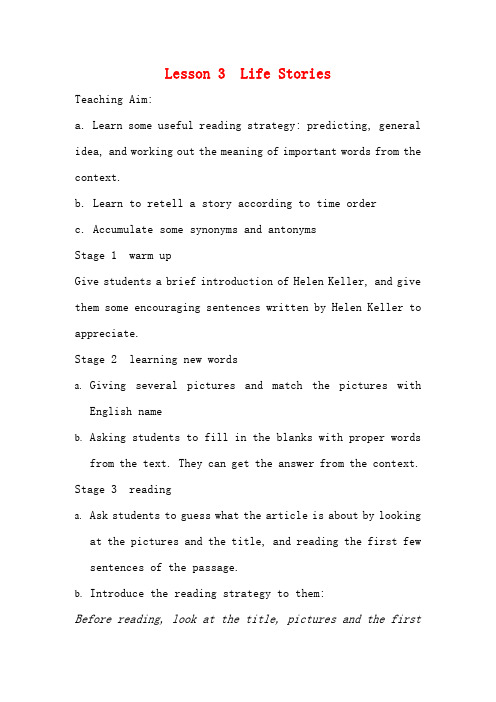
Lesson 3 Life StoriesTeaching Aim:a. Learn some useful reading strategy: predicting, general idea, and working out the meaning of important words from the context.b. Learn to retell a story according to time orderc. Accumulate some synonyms and antonymsStage 1 warm upGive students a brief introduction of Helen Keller, and give them some encouraging sentences written by Helen Keller to appreciate.Stage 2 learning new wordsa.Giving several pictures and match the pictures withEnglish nameb.Asking students to fill in the blanks with proper wordsfrom the text. They can get the answer from the context. Stage 3 readinga.Ask students to guess what the article is about by lookingat the pictures and the title, and reading the first few sentences of the passage.b.Introduce the reading strategy to them:Before reading, look at the title, pictures and the firstcouples of lines of the text.Look for clues to help you predict what kind of text it is and what it is about.c.Read the text to get the general idea. Ignore words youdon’t know.d.Read the text again. Try to work out the meaning ofimportant new words. Use a dictionary if you can’t.e.Read any comprehensive questions and try to think ofpossible answers. Then find answers to questions in the text.f.Ask students to predict what happened later to HelenKeller.Stage 4 Understanding of the whole passageGive students some clues to work out the structure of the passage.And ask students to retell the story to their partner. Stage 5 an oral practice for students----What kind of teacher do you think Anne Sullivan is?Stage 6 ask students to finish exercise 3 and 4 by themselves.。
高中英语 Unit 16 Lesson 3 Life Stories教案 北师大版选修6
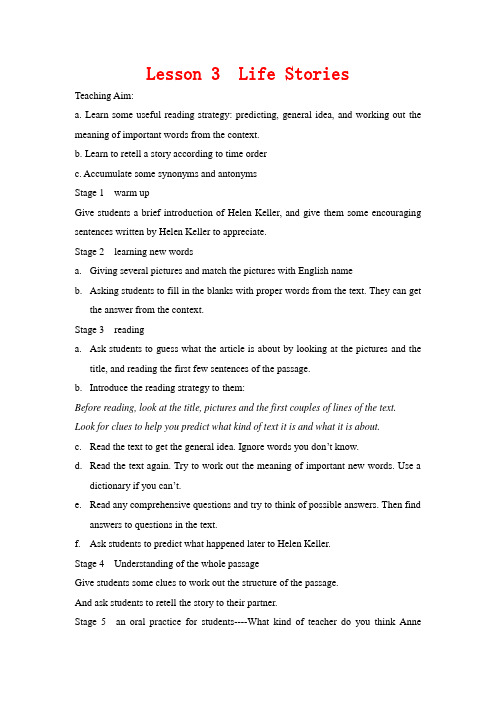
Lesson 3 Life StoriesTeaching Aim:a. Learn some useful reading strategy: predicting, general idea, and working out the meaning of important words from the context.b. Learn to retell a story according to time orderc. Accumulate some synonyms and antonymsStage 1 warm upGive students a brief introduction of Helen Keller, and give them some encouraging sentences written by Helen Keller to appreciate.Stage 2 learning new wordsa.Giving several pictures and match the pictures with English nameb.Asking students to fill in the blanks with proper words from the text. They can getthe answer from the context.Stage 3 readinga.Ask students to guess what the article is about by looking at the pictures and thetitle, and reading the first few sentences of the passage.b.Introduce the reading strategy to them:Before reading, look at the title, pictures and the first couples of lines of the text. Look for clues to help you predict what kind of text it is and what it is about.c.Read the text to get the general idea. Ignore words you don’t know.d.Read the text again. Try to work out the meaning of important new words. Use adictionary if you can’t.e.Read any comprehensive questions and try to think of possible answers. Then findanswers to questions in the text.f.Ask students to predict what happened later to Helen Keller.Stage 4 Understanding of the whole passageGive students some clues to work out the structure of the passage.And ask students to retell the story to their partner.Stage 5 an oral practice for students----What kind of teacher do you think AnneSullivan is?Stage 6 ask students to finish exercise 3 and 4 by themselves.。
